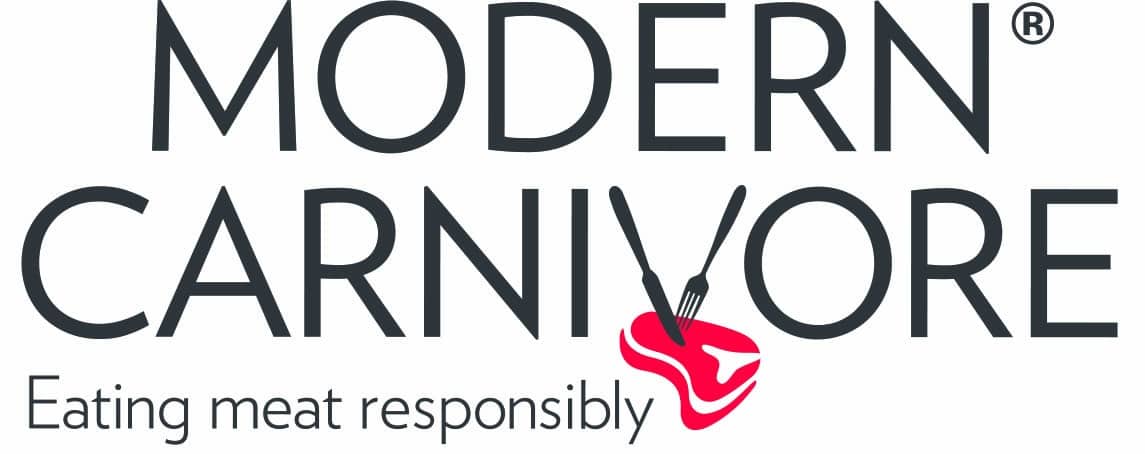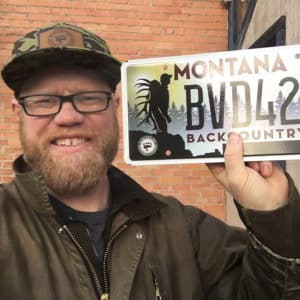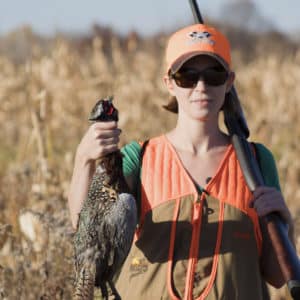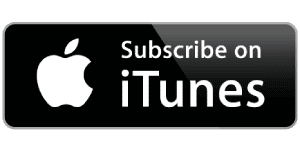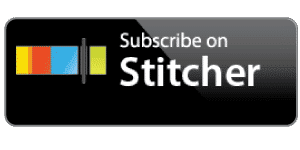Podcast: Play in new window | Download (Duration: 51:09 — 70.2MB) | Embed
Subscribe: Apple Podcasts | Spotify | RSS | More
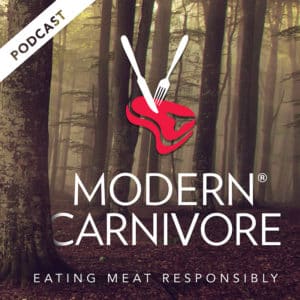 In this third episode of the Modern Carnivore podcast I sit down with Land Tawny who is the President and CEO of Backcountry Hunters & Anglers (BHA) and Ashley Peters who is a new hunter and member of BHA. Backcountry Hunters & Anglers is leading the fight to protect the public lands critical to the future of our democracy of hunting and the outdoor experience in the U.S. As an experienced conservationist, and new hunter, Ashley provides insights on what it means to be a hunter in today’s culture, and the challenges and opportunities that go with it. Check out the links below for more details.
In this third episode of the Modern Carnivore podcast I sit down with Land Tawny who is the President and CEO of Backcountry Hunters & Anglers (BHA) and Ashley Peters who is a new hunter and member of BHA. Backcountry Hunters & Anglers is leading the fight to protect the public lands critical to the future of our democracy of hunting and the outdoor experience in the U.S. As an experienced conservationist, and new hunter, Ashley provides insights on what it means to be a hunter in today’s culture, and the challenges and opportunities that go with it. Check out the links below for more details.
The Value Of Public Lands
Reference Links from Today’s Podcast
Backcountry Hunters & Anglers Website
What is the North American Model of Wildlife Conservation? (Wikipedia)
Theodore Roosevelt Association – Teddy Roosevelt, The Conservationist
History of the Federal Duck Stamp (U.S. Fish & Wildlife Service)
America’s Public Lands: Origin, History, Future (Public Lands Foundation)
What Is The Pittman-Robertson Federal Aid In Wildlife Restoration Act? (Wikipedia)
Cellular Agriculture: Growing Meat In A Lab Setting
Why Listen to The Modern Carnivore Podcast?
With all the podcasts out there why would you want to listen to this one? Well, if you’re looking for a new adventure in the outdoors we’ve got some very interesting guests talking about topics related to honest food and wild adventures. Get ready to be entertained and enlightened on topics related to hunting, fishing, foraging…and more.
Here are a couple other podcasts you may be interested in:
Episode 2: Robyn Migliorini from Modern-Hunters.com shares her story of going from vegan to thoughtful hunter
Episode 4: Cooking wild game well can be a daunting task for some, but not for Jamie Carlson and Jack Hennessy. These two experienced wild game cooks talk about everything from braising goose to grilling moose.
Do you have a question that you’d like answered on the podcast, or an idea for an episode? Shoot us a note at info@modcarn.com.
Subscribe to the Modern Carnivore Podast on iTunes and/or Stitcher.
Please support the podcast by giving us honest feedback on iTunes or wherever you listen to the podcast. And if you do like it, don’t forget to tell your friends about it!
Listen to new hunter @AshJPeters thoughts on conservation and learning to hunt. Share on XIf you enjoyed this podcast you may also like this video of why Modern Carnivore was created.
Here’s a transcript of today’s Episode – Public Lands
Intro: 00:11
Welcome to the Modern Carnivore Podcast, a guide for those interested in hearing more about hunting, fishing, and other paths to eating more responsibility. Now, here’s your host, Mark Norquist.
Mark: 00:21
Hello and welcome to this third episode of the Modern Carnivore Podcast. I recently caught up with Land Tawny and Ashley Peters when I was down in Bentonville, Arkansas. Land is the President and CEO of Backcountry Hunters and Anglers, a conservation organization focused on public land issues. And Ashley is both a member out of the Minnesota chapter of that organization. Uh, but most importantly she is a new hunter. Just started hunting a couple of years ago. So today’s podcast, we talk about public lands and threats to them. And this is important because I think a lot of people don’t realize that public lands in the US are truly the backbone of the North American Model of Wildlife Conservation. And without getting into too much detail here, this model was formally articulated, to be honest just in the last couple of decades, but it’s built off the attitudes in work of many people in the hunting and fishing community, going way back to the nineteenth century, there are seven tenants to it and the seventh one is about the democracy of hunting, which is really based on inspiration from the work that Teddy Roosevelt did and when he talked about open access to hunting, that it would result in many benefits to society. And that open access, as I view it, is really derived from your ability and my ability to go out on public lands and waters to hunt and fish.
Mark: 01:57
And this is something that’s very unique in the world and it’s something we need to protect because there are very few places that have this opportunity for everyone. So I’ll provide some links in the show notes page. So if you are interested in learning more about it, you can. Today. We also talk about hunters and anglers as conservationists more generally. You know, the hunting community has been focused on conservation of wild places and animals and plants and really the entire wild environment for well over a hundred years. And it resulted in the last century in establishment of self imposed excise taxes on outdoor equipment that are focused on hunting and fishing. And those purchases that outdoors men and women have made, have resulted in taxes that contributed billions of dollars to conservation in America and again we’ll provide some links on the show notes page about that. We also talk about the rise of fake meat, which if you’re not familiar with it is something that’s, ah, very intriguing but also, I think very scary that is growing meat in labs. And, also what it means to start hunting as an adult – getting Ashley’s is perspective on that. She shares some new terminology for duck hunting and, also redefines what conceal and carry really means. So I hope you enjoy today’s conversation and look for the show notes at Modcarn.com/podcast3. That’s podcast and the number three.
Mark: 03:33
OK, we are, uh, here in Bentonville, Arkansas. Never been down here before with Land Tawny – the president and CEO of Backcountry Hunters and Anglers.
Land: 03:33
I’m here.
Mark: 03:46
That’s right. (he just) gave the keynote address at the summit were attending. And (I’m also joined by) Ashley Peters, an outdoor communicator, and for those of you who follow Modern Carnivore is someone who we have been following last couple years on her journey to becoming a hunter and Angler.
Ashley: 03:46
Yea, I’m happy to be here today.
Mark: 04:04
Great. So, um, you know, one of the things we talked about on the Modern Carnivore Podcast and a lot of the content we do is, is the importance of public lands. So for people who are coming to hunting and fishing for the first time as an adult, where do they go. And Land…You were the keynote speaker here at the Outdoor Blogger Summit, which is this conference that is bringing national voices in the media, brands, big brands, we’ve got Patagonia here, we’ve got all these other, other big brands here. Um, and you gave the keynote on public lands. So what’s interesting, I think is looking at that with the organizers, why they chose that for something where we’ve got all these different sports and activities coming together and you as the head of a, of a conservation organization focused on hunting and fishing and public lands are giving the address. Why do you think this issue has gotten so big? And it’s relevant to, to really everyone that are concerned with the outdoors
Land: 05:08
First one is that there’s threats out there to our public lands and maybe like there never has been before. You know, ever since Roosevelt kind of started this public land legacy, you know, over a hundred years ago, um, there’s been threats, but it seems now that they’re even more dire. And so I think that’s, that’s creating an awakening, you know, within the public. And then, you know, I think why did they ask me in particular, I think it’s partly because of the work we’re doing at Backcountry Hunters and Anglers, but I also think it’s the opportunity to really build synergy between like consumptive and non-consumptive users. And I don’t know if those are the two greatest words you know, or if they’re the way (we should refer) to it.
Mark: 05:49
So by “non-consumptive” you mean bikers, hikers, paddlers and consumptive been hunters and anglers, right?
Land: 05:53
Yeah. So pulling the trigger or catching fish versus just kind of being an observer I guess. And so I think that that is growing right now because of these threats. And I think that’s partly why they wanted me to have me down here just to try to help perpetuate this kind of union that is being created. And you know, one of the things I said this morning too is that hunters – they mountain bike, they paddle, they mountain climb, you know, um, and so, this bifurcation has happened more by outside entities, I think the internal entities. And so it’s for us to break down those barriers so that you know, that we come out a lot stronger and so that we can have more of an impact when it comes to these threats throughout our public lands.
Mark: 06:38
Why do you think the groups have been so bifurcated in the past? Do you think it’s just the nature of focusing on what you love, and if I’m a biker, I’m just going to focus on biking and I don’t know any guys who hunt or fish are or what?
Land: 06:46
So I think hunters and anglers doing conservation for over a hundred years in this country and um, and the biking kind of mountain climbers and skiers, that’s all kind of new, you know. And not that people haven’t been mountain biking and especially skiing for a long time. But it’s fairly new and so I think that’s part of it is just that hunters been doing it for a long time. This new constituency is, uh, is just kind of starting. That’s part of it, I think that there are outside entities to that want to be like hunters are conservatives and then mountain climbers and paddlers are liberals, right? They they really want to like keep it that way when that couldn’t be further from the truth because you have liberal hunters and you have conservative mountain bikers. And so they’ve wanted to kind of keep us separate, I think to divide us politically. And again, like if what I just said. Like why I’m here, and why this thing is happening is, that bringing those things together…so politically we’re a huge force, which I think is pretty cool.
Mark: 07:45
So why in your mind, are our public lands so critical to specifically hunting and fishing?
Land: 07:53
I mean, you know, I didn’t, I grew up in Montana. (My) family, didn’t homestead. I have a lot of private land owners I know, and so I can go onto their place. But really public lands where I do the majority of my hunting and fishing. And so it’s a place…it’s like this great equalizer, you know, like I said this morning, like you don’t have to be, you know, a rich banker from New York City to go out and hunt because we have these public lands. It’s available to anybody. It’s like this, you know, it’s this great expanse that, that doesn’t cost you anything. And so to me it’s vitally important is this great equalizer. It’s the hunting and fishing, you know, again, like people can hunt and fish on private lands and they can pay for leases. You know, like the leasing thing to me is, is absolutely crazy because it’s not even part of my lexicon, because I am not going to go pay money to go hunt some place. I’m going to go on public land and public water. And so, um, to me it’s public lands and waters. Like without it, I don’t think we have the hunting and fishing heritage in this country, you know, and that big/huge outdoor economy that goes with it. Like all that goes away if our public lands aren’t there.
Mark: 08:58
Yeah. Absolutely. What do you say to people who, let’s say people in the hunting and fishing community who maybe feel exasperated that hunting and fishing groups are the ones who’ve been carrying the water relative to public lands and conservation for so long and other groups have haven’t and they get mad about it? Because I hear that, you know, at different times. What would you say to someone who has that perspective?
Land: 09:25
So part of, part of that as I was taking credit for things that we don’t necessarily do, like, you know what I mean? I think there’s like the Pittman Robertson stuff, there’s the duck stamp which we contribute to, um… But our public lands are paid for by every single…you know…the management of our public lands is paid for by every single American in this country. Right? Like you pay taxes and that’s what pays for the management: fire, road maintenance, all those things. I mean Congress gets to decide on how much money they give. But every single American pays for that. On the other side of that, like, you know, I think we should be proud of what we do, um, and, what we contribute through excise taxes in particular. But we should wear that as a chip on our shoulder. I think we should encourage like the other side, again that’s the wrong way to say it, I think we should encourage more of that kind of altruistic behavior, right? And so, I think, instead of being like, Oh man, like we’ve done it all the time and you guys aren’t doing anything. It shouldn’t be like, hey we’ve been doing this for awhile and you guys should think about, you know, getting a tax on boots and backpacks and binoculars and those are things that hunters and anglers use. And so we’d be paying into that too. But make it more of like a positive. I think like the chip on the shoulder doesn’t work for us. I think it’s a conversation stopper rather than a starter.
Mark: 10:34
I completely agree. I love what you said this morning in your keynote about the idea of um, everyone should be buying a duck stamp, not just the bird hunters know you. And so, have you got thoughts on that Ashley?
Ashley: 10:49
Well, I think that I think that a lot of people are unaware of all of the funding that goes into public lands. And until you start hunting fishing, um, and doing some of these things where you have to buy licenses, you have to buy equipment…you’re not aware of it because you haven’t had to interact with it. You haven’t had to put money into it and think about it like, “man, this is 75 bucks for this license”…well, I guess this is my donation to conservation. You know? And you go forward with it, but I think that if you don’t have to buy those licenses and you don’t have to think about some of those things, it seems like it is completely free. And so the idea of then paying in some form is still an adjustment for some people. And so, um, I think it’s important for…I think this conversation is really important for folks who hike, bike and paddle to think about as well because we all need to be putting in to that, um, that conservation funding and support.
Mark: 11:49
I couldn’t agree more. And like you said a moment ago Land I, I think rather than for people who have been hunting and fishing for a long time, rather than having a chip on your shoulder of, hey, we’d been paying for it now you guys should too. I think it’s a situation of, hey, this is, this is what we’ve learned. And if other groups would love to do it, here’s, here’s how we’ve had success and here’s why we, why we enjoy doing it.
Land: 12:10
I mean, we’re not, I mean we’re never going to be in a place where we have enough money. I mean literally like whether that’s, you know, like, like either buying private land and turn that into public land, or to managing Fisher Wildlife. Like, I mean, I would love to think about a day when we have all the money we need, but I don’t think it’s ever going to happen. And so, we need more people to contribute and I think that’s the positive kind of way to talk about versus, “man, we’ve been doing it (and) now it’s your turn!”. That’s a negative connotation.
Mark: 12:35
No, absolutely. So, Ashley, you started hunting last year. It was your, is your first season going out? Uh, I was with you on your first pheasant hunt when you got a pheasant. I believe this year you went out waterfowl hunting, correct?
Ashley: 12:35
Yes.
Mark: 12:52
So you actually bought your first duck stamp maybe or. OK. So tell us about, I mean, how was it, was it a, was it a good experience?
Ashley: 12:59
Uh, the duck hunting specifically?
Mark: 12:59
Yea.
Ashley: 13:06
Uh, yes. Um, something valuable that I’ve learned in learning to hunt is that you not only have to be aware of what you’re aiming at, you also have to be aware of what you can fall into. Um, so a lot of puddles and cold water in various bird hunting pursuits. So, um, I’ve, I’ve definitely, that’s been an adjustment to constantly think about like, OK, so I’m focusing on this horizon. I’m like lifting up, but I also have to know, um, you know, the blind that we used for duck hunting was just a canoe with some decorations that looked like the wetlands that we’re in. And so, um, we were sitting there and the thought kept running through my mind when I shoot this duck, am I going to tip over behind me into the three feet of, of cold water, you know, as I do that? And I mean, it’s completely possible. So we didn’t actually take any shots. It was kind of a bad morning for duck hunting, but we went out in the afternoon, we went grouse and woodcock hunting. Um, and that was, that was really good experience. But again, the puddles, um, I think I fell into a two or three foot puddle in the middle of a marsh woodcock hunting.
Land: 14:31
It won’t be the last time, by the way. You know, I’ve been duck hunting my whole life, I can say that like, oh, I know how to not get wet…you’re going to get wet and cold when you duck hunt and that’s just like, kind of a given.
Ashley: 14:39
Yes. So, um, but it’s been fun. I mean, always I’m with people who can laugh about it and like, um, were well prepared when we go out. And so I feel very comfortable with the people that I’m with. Um, uh, I’ve, I’ve largely had women as mentors and that’s been fantastic because there are all sorts of, I mean to be honest with you, like there are all sorts of jokes and things that you know, that we make and talk about that I wouldn’t necessarily talk about if guys were around, you know. Um, and, and some of that has to just do with a perception of being a woman who hunts. It’s just to some degree, a different experience in, in certain environments or certain cultures. So, um, it was great. Duck hunting was…it was gorgeous. The sunrise was coming up. Everything was like pink and then it was blue. And then, um, we had some swans fly over and um…so it was great birding as well.
Mark: 15:39
Yeah. Yeah. I think duck hunting is, is definitely, it can be one of the most enjoyable hunts out there. Um, but it is, it can be daunting and, and challenging. And I think…(cough) excuse me…anybody who starts starts hunting…I think the key is, if you’re going to go duck hunting, go out with somebody who’s got experience. Because like you said, especially if your water hunting like we do in Minnesota. It can be dangerous, you know?
Ashley: 15:39
Oh, absolutely.
Mark: 16:08
What I was…this was probably 20 years ago….I was younger. I was, it was opening (of) duck season, uh, up at the hunting shack with my family and friends. Everybody left. I was going to stay in other day and hunt by myself. It started snowing. Wind was coming down from Canada. Perfect ducky weather…OK? Birds started flying and I’m like, “I gotta get down down the creek to the lake to hunt”. And I got down there and it was just nasty weather. I shot a shot a mallard, and went over to pick it up in a canoe. I went to pick it up and reached over (the canoe gunwal) and the thing was still alive and started flapping. It caught me off guard. I flipped out of the canoe. It could have been a really, really bad situation. I ended up losing my gun in the bottom of the bog…somehow was able to get the canoe backup upright, paddle back up the creek to the hunting shack, get a fire stoked in inside, dry out, and then that afternoon was able to go back down because they mark the spot with a pole. I stuck my rice pole upside down in the bog. After two hours of punching down with a stick, I finally found the gun. But yeah, I mean it could’ve been bad. I mean there are stories all the time duck on understanding, so I think that’s something just to make sure…that everybody who is starting to hunt knows is duck hunting is great, but make sure you go out with somebody who knows what they’re doing and they’ve got experience because it can be dangerous.
Ashley: 17:26
Yeah. We went out two days back to back. And even the second day I could already tell that I was more comfortable being in that environment, um, because it, it’s so new and there’s so much involved in it. So much equipment, you know, you’ve got the decoys, you got the blind, you got all the stuff that you’re wearing. So yeah, I, I definitely agree. It makes a big difference to go with someone that you feel really comfortable with and confident in.
Mark: 17:51
And, you got to make sure they’ve got the right decorations.
Land: 17:54
I picked that up. I’m gonna start using “decorations” in all my talks. We didn’t camo that blind up…we put some decorations on it. I will say though you know, we’re talking about public lands and waters earlier, like that ability to like go learn like Ashley’s doing….or to have that experience where you almost died. Like, as crazy as that sounds – that’s awesome that we have the opportunity like for that to happen. Like these are places that you learn and uh, you have to obviously be prepared and then in that case, but you have to make some pretty smart decisions very quickly to survive that, right? Like if you went and tried to like get your gun at that point, you probably have gotten hyperthermic and died, right?
Mark: 17:54
Yea.
Land: 18:34
Like you have to go home and go…and so like I think that’s just rad that there’s those places out there that like we don’t control everything. Right? Like things like that duck like that was unplanned for you. And then that happened and then all of a sudden you got to start making decisions after that, which I think is absolutely awesome.
Mark: 18:50
So this last spring when Hal came to Minnesota. Hal Herring – the, the host of the uh,
Land: 18:50
Podcast and Blast by Backcountry, Hunters and Anglers.
Mark: 19:00
And uh, we drove up the shore because he’d never been to Minnesota before. We went up to Gooseberry Falls, which is up on, up on the North Shore. And one of the things he said that he loved seeing when we were down there…we went down to the falls. These are big falls, very dangerous rock cliffs. And there’s a sign there, it says “swimming, not recommended”. And he and he made a comment on that. He’s like, I love that. It’s not that it’s not allowed, you know, it’s just that we don’t recommend it, but hey go at it if you want.
Land: 19:27
Your actions do have consequences, right?
Mark: 19:32
Exactly. So Ashley, you’ve now gone after pheasant, you’ve gone after ducks. Um, what about, what about big game animals? You know, that sometimes, uh, it’s something I am always interested to ask people about who are just starting to hunt. Some people go right after it like, “I want to go deer hunt, you know, the most popular big game animal in North America (because) everybody goes after that”. Um, other people don’t have any interest. So, I think you and I have chatted about it a little bit before, but not a whole lot. So, I mean, what, what is your perspective on that? Is that something you want to do or not?
Ashley: 20:05
Well, I think at this point I’m still getting used to the idea of hunting to be honest. Um, you know, there, there are so many pieces that go into learning to hunt. So the biggest ones starting out for me was just buying, owning and transporting a gun. That was a huge adjustment for me, you know, and so I think, I think in the process of, of thinking about what are you going to hunt, when are you going, what do you want to get out of it? For me right now, I mean I work an office job so I’m sitting most of the week. So the most important thing for me with any pursue outdoors is to be moving around and that’s, that’s how I got into fly fishing. It was a great way to get a workout on a weekend and also have a bunch of fun catching fish.
Ashley: 20:52
Um, and right now that’s what hunting is for me. It’s getting out in the field, moving around, hanging out with friends and maybe you’re getting a meal out of the deal. So I’m really, I think right now time, money and resources wise, I need to stick with, with bird hunting for the moment, but I mean, I’m not ruling it out. It just, um, when you’re learning to hunt, you have to take things one, one piece at a time and do what you’re comfortable with. And right now I’m still getting comfortable with just bird hunting and so…I’ve completely thought about it. Um, but it is something that I’m choosing to not think about it more because for me, there are still so many pieces that I need to work through with the hunting that I’m doing right now. So I think that, uh, like I said, the, the biggest thing right now is that I’m getting outside, I’m moving, I’m interacting with the environment. So that’s where I am.
Mark: 21:54
Yeah, no, that makes sense. So it is, it’s, you know, one of the things I talk about is a lot is for somebody who hasn’t ever hunted before land, you grew up doing it. I grew up doing it. Um, it’s a daunting thing. Where do you start? How do you get comfortable with it? Like you just said, I mean, you could duck hunt for the next 30 years and slowly get more comfortable with it, but you gotta be careful not to bite off too much. Um, and, and really in really figuring out what you, what you like, what you want to do with. And so I think you’re, you know, everybody’s gonna have their own approach, but I like the perspective that you’ve got. You’ve got share, you get to share with people, your, uh, your story, you just talked about about…you know what I’m talking about
Ashley: 22:39
I know exactly what you’re talking about….talk about decorations. Yeah. So I, uh, when I first bought a gun it came in a cardboard box and so I had in my apartments and practically downtown, St Paul, Minnesota and um, so I take it out of the box and I put it together and obviously it can’t go back into the cardboard box once it’s all put together and at that point like I’d gotten it to together. So I didn’t want to take it apart again and then I realized we were going to go trap shooting and so I realized I needed to get it out to my car, but I hadn’t thought through enough to buy like a transport…like case. And so I was looking around thinking like, oh shoot, what do I have that looks like I’m not hiding a gun under or something like because I think that looks scarier than just having like a gun case. So, um, I grab a bridesmaid’s dress out of my closet and I put the gun underneath the bridesmaid dress and I carried it out to my car that way and I went to the nearest store…
Land: 23:44
That is awesome! I wish I had pictures of that. But I wonder if like this is the only time it’s happened, like I kinda want to think that it’s happened more often, but like, like maybe not like it…
Mark: 23:51
It brings a whole new meaning to conceal and carry.
Land: 23:51
Totally. Totally
Ashley: 23:56
But I did go buy a case as soon as I could. And I mean, it’s just one of those things that like, when you’ve bought a gun, you’re thinking through like, what are their (perceptions) of, what are my neighbors going to think? I’m in the middle of a city. Most people are not carrying (guns). I mean, and a lot of times people are scared of guns in urban areas and so, you know, the choices of a dress is funny. But it’s also because like I don’t want to feel like my neighbors feel threatened or that they don’t understand, um, owning a gun. And so I wanted to make sure to have a conversation with neighbors, um, about like, yeah, if you’ve seen me hunting, you’ve seen me in blaze orange, this is what I do, this is, this is, you know, why I do it. So making sure that there’s a positive perception of hunting as well. And we might get into this a little bit later, but one of the things that surprised me about learning to hunt is that I may not be super comfortable yet with the term hunter…
Ashley: 25:05
…like I still don’t necessarily think of myself as a hunter. Anybody who’s seen pictures of me hunting or heard that I went on a hunt has no hesitation referring to me as a hunter. So friends, family, people who have never hunted before an article come up in the like, hey, you’re a hunter, what do you think about this? And so immediately you’re pulled into that conversation in a way that if, um, if you haven’t thought through a few things, it can be overwhelming because there are a lot of big questions and if you’re not comfortable being uncomfortable than hunting’s going to be a real stretch for you. But the nice thing is I think you become a bigger person and you have to dig a little bit philosophically when you start hunting and regardless of where you land as, as a result of those questions, I think that it makes you, um, a deeper conservationists. Like it makes you think deeper about issues related to hunting, fishing, being on public lands, all of that. So, um, so it, it’s been interesting because I get referred to as a hunter now. Um, and, but I think it’s opened up a lot of really great conversations.
…cont. Request a full transcript of today’s episode by contacting us at info@modcarn.com.
